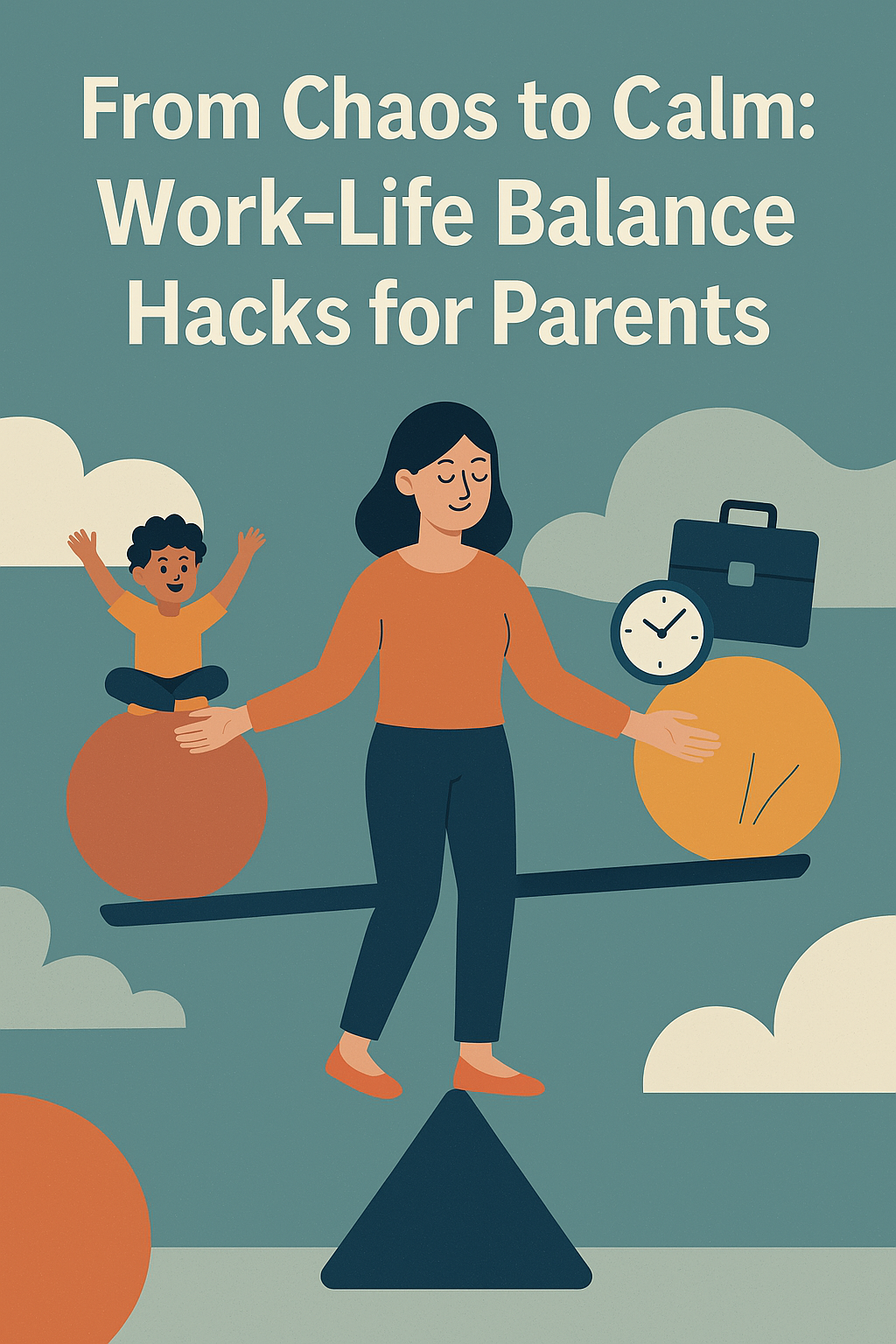
From Chaos to Calm: Work-Life Balance Hacks for Parents
Introduction: The Balancing Act of Parenting
Parenting is a juggling act—one minute you're playing superhero, and the next, you're racing against the clock to meet work deadlines. As much as we love our kids, achieving work-life balance often feels like an impossible feat. But it doesn't have to be that way! In this article, we'll explore practical parenting advice, child development tips, and work-life balance hacks to help parents regain control of their lives and find moments of calm amidst the chaos.
1. Understanding the Importance of Work-Life Balance
Before diving into hacks and tips, it’s important to understand why maintaining work-life balance is crucial for both parents and kids. Too much stress at work can affect your health, and too much time away from home can impact your relationship with your child. Striking a healthy balance is key to creating a fulfilling life both personally and professionally.
2. Practical Parenting Advice: Tips for Navigating the Daily Grind
Setting Realistic Expectations
As a parent, it's easy to fall into the trap of thinking you have to do it all—perfectly. But the reality is that nobody can! Start by setting realistic expectations for yourself and your family. Don't be afraid to ask for help when needed and learn to delegate tasks, both at home and work.
Creating a Flexible Schedule
Flexibility is a lifesaver. Whether it’s adjusting your work hours or involving your children in household chores, flexibility allows you to find a rhythm that works for everyone. Keep communication open with your partner or support network, and be prepared to adjust plans when life throws curveballs.
3. Child Development Tips for Nurturing Happy, Confident Kids
How to Encourage Creativity in Children
Creativity is not only fun, but it's also a key aspect of child development. Encourage your child to explore their imagination through arts, crafts, and free play. Educational toys, such as building blocks or art supplies, can also foster creativity while keeping them entertained and learning at the same time.
Supporting Emotional Growth
Emotional development is just as important as academic learning. Ensure that your child feels heard and understood by practicing effective communication. Validate their emotions and provide a safe space for them to express themselves.
4. Work-Life Balance Hacks Every Parent Needs
Time-Blocking Your Day
One of the best work-life balance hacks is time-blocking. Set aside specific blocks of time for work, family, and self-care. When you’re at work, focus on work; when you’re with your kids, be present and put the phone away. This simple trick can help you manage your time more effectively, reducing the stress of multitasking.
Leveraging Technology to Help You Stay Organized
There are tons of apps designed to help parents manage their busy lives. Whether it's tracking work meetings or meal planning, the right apps can make life easier. For example, try using digital calendars to schedule family activities and set reminders for important tasks.
5. Best Apps for Helping Kids with Homework
When it comes to homework, the struggle is real. Luckily, there are several apps that can help your child stay focused and organized. Some top apps include:
- Khan Academy: A free educational platform offering lessons in various subjects.
- Google Classroom: Ideal for organizing homework assignments and collaborating with teachers.
- Photomath: Perfect for helping kids solve math problems step-by-step.
6. Top Tips for Managing Screen Time
In today's digital age, screen time is a growing concern for parents. Here are some strategies for managing it effectively:
- Set clear limits: Establish daily screen time limits and stick to them.
- Encourage educational content: Use screen time as a tool for learning by selecting educational apps and websites.
- Balance with outdoor play: Ensure that screen time doesn’t replace physical activity or outdoor exploration.
7. Affordable Ways to Create Fun Learning Activities at Home
Who says learning has to be expensive? Here are a few fun, budget-friendly ideas for creating learning activities at home:
- DIY crafts: Recycle household items to make educational crafts that teach kids about colors, shapes, or history.
- Nature walks: Take your kids on a nature walk and teach them about plants, animals, and ecosystems.
- Storytime: Reading books together can enhance vocabulary and spark creativity in your child.
8. Effective Communication with Teenagers
As your child grows, effective communication becomes even more important. Here are a few tips to keep the lines of communication open:
- Listen actively: Pay attention to what your teen says without interrupting or judging.
- Respect their independence: Allow your teen to express their thoughts and opinions, even if you don’t agree.
- Offer support: Let your teen know you're always there to help, whether it’s with school or emotional challenges.
Conclusion: Finding Calm in the Chaos
Parenting is a journey that can often feel like a rollercoaster ride. But with a little organization, flexibility, and some work-life balance hacks, you can turn the chaos into calm. Remember, there’s no one-size-fits-all approach to parenting—what works for one family might not work for another. The key is to be patient with yourself and your children, and always strive for progress, not perfection. So, take a deep breath and embrace the adventure!
FAQs
- How can I maintain work-life balance as a parent?
Set boundaries, use time-blocking, and prioritize self-care. - What are the best educational tools for kids in 2025?
Educational apps, interactive toys, and online learning platforms. - How do I raise confident children?
Encourage independence, praise efforts, and be supportive during challenges. - What are practical ways to create a positive learning environment at home?
Designate a quiet space, minimize distractions, and encourage curiosity. - What are the top parenting challenges and how do I overcome them?
Managing screen time, balancing work and family, and effective discipline. The key is consistency and communication.